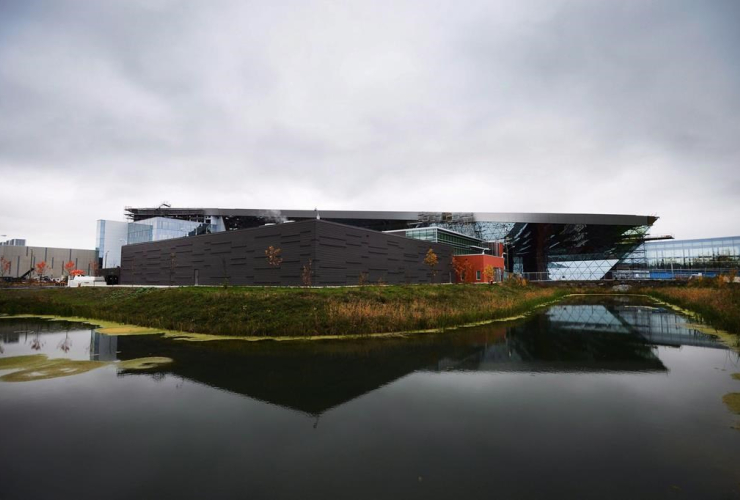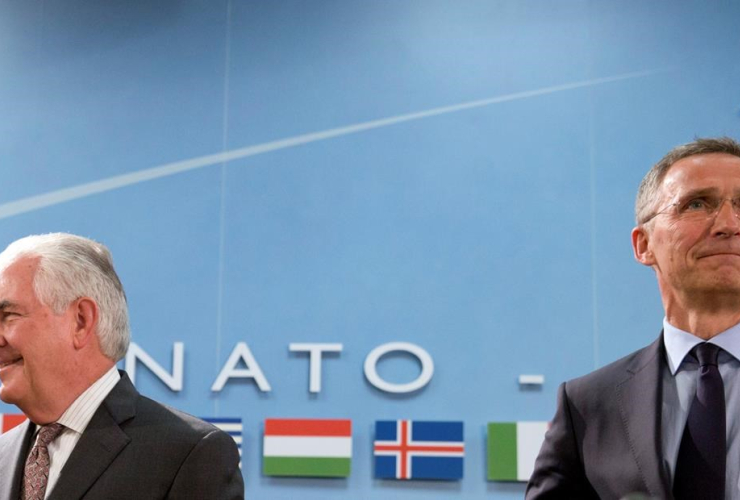Canada joined NATO allies on Thursday in blaming the Russian military for new cyberattacks that targeted the international chemical weapons agency and the investigation into the mysterious 2014 crash of a Malaysian airliner over Ukraine.
A statement from Global Affairs Canada said the latest incidents are part of a malicious pattern of behaviour that has included Russia's 2016 attack on the Canadian headquarters of the World Anti-Doping Agency.
Canada and it allies accused Russia's secret military intelligence unit, the GRU, of a brazen attempt to hack The Hague-based Organization for the Prohibition of Chemical Weapons in April.
Dutch Defence Minister Ank Bijleveld said the attack was disrupted and four Russian intelligence officers were immediately expelled from the Netherlands.
The GRU was also accused of trying to hack the investigation into the 2014 downing of a Malaysian Airlines flight over eastern Ukraine.
Canada echoed a cascade of condemnation from Australia, Britain and the Netherlands in accusing Moscow of a series of unprecedented espionage operations in both the physical and digital worlds.
The Global Affairs statement branded the Russian actions as "malicious," saying Canada has "high confidence that the GRU was responsible" for the attempted attack on the Organization for the Prohibition of Chemical Weapons. Canada serves on the OPCW's executive council.
"The incidents identified by Canada and our allies, including the GRU's attempt to undermine the work of the OPCW, underscore the Russian government's disregard for the rules-based international order, international law and established norms," the statement said.
"The attempt to compromise the networks of the OPCW is consistent with Russia's broader attacks on the independence and professionalism of the personnel of the OPCW."
The events have a connection to Canada, the statement said, pointing to the 2016 attack on the Montreal-based World Anti-Doping Agency.
Global Affairs said the cyberhacker group Fancy Bear/APT28 pilfered confidential athlete data from the agency's website and circulated it publicly.
"The Government of Canada assesses with high confidence that the Russian military's intelligence arm, the GRU, was responsible for this incident."
U.S. authorities have charged seven GRU officers — including the four caught in The Hague — in an international hacking rampage said to have targeted more than 250 athletes, a Pennsylvania-based nuclear energy company, a Swiss chemical laboratory and the OPCW.
In Ottawa, Andrew Leslie, the parliamentary secretary to Foreign Affairs Minister Chrystia Freeland, said: "I'm told that the FBI has charged seven Russian agents with involvement in this process and that the RCMP are also involved and assisting."
Moscow has issued a series of denials about the incidents.
The Russian Embassy in Ottawa said in a statement Thursday that the allegations are "fake news" and part of an "anti-Russia witch hunt" by the U.S., Britain and their "willing allies, including Canada."
"The major goals in this brazen propaganda war are to brainwash and scare" international and domestic audiences and distract from NATO's own expanding cyber war activities, the statement said.
Russia had interests in the latest cases: the OPCW was investigating reports that a Soviet-made nerve agent had been used against a Russian ex-spy in England, and Russia has been blamed by some for being involved in shooting down Malaysian Airlines Flight 17.
Britain's National Cyber Security Center said Thursday that four new attacks are associated with the GRU as well as earlier security hacks. It also cited attacks on the World Anti-Doping Agency, Ukrainian transport systems and the 2016 U.S. presidential race.
"We are going to actually make it clear that where Russia acts, we are going to be exposing that action," said British Defence Secretary Gavin Williamson, who branded Russia's actions as those of a "pariah state."
The British ambassador to the Netherlands said men caught with spy gear outside OPCW, for example, were from the same GRU section (Unit 26165) accused by American investigators of having broken into the Democratic National Committee's email during the 2016 U.S. presidential election.
The OPCW was investigating the poisoning in Britain earlier this year of GRU defector Sergei Skripal, in which the nerve agent Novichok was used.
— with files from the Associated Press
Another one of those things.
Another one of those things. Nobody ever knows who did a hacking attack. So they have no idea actually whether it was Russians. I see, as usual, no mention in the article of anything like evidence relating to who did this. They say they have "confidence" and they say they've expelled some Russians because, uh, they have this "confidence" stuff, or something.
The article also is decidedly unclear about just exactly what was done. It was "hacking", but it doesn't mention any damage done. So presumably that means the hack was to access information, which means the information was secret. So then, why exactly does an international organization like the OPCW have secrets from the government of Russia, a member state? Why exactly would the investigation into the crash of that Malaysian airliner be keeping secrets from the Russian government (or from anyone else)? I'd actually be interested in knowing just what those secrets are. Or if they aren't keeping secrets from the Russian government, then what on earth is the Russian government's motivation supposed to be for hacking them?
It's possible it was Russians--can't rule it out since we have no actual idea. But this leap from zip-all evidence to "Da Roosians dunnit!" just as the convenient designated scapegoat for all ills I find really annoying. I see it over and over. I'm sure the Russians are fairly ruthless in their conduct of international affairs--just like everyone else--but it's hard to tell because there's so much smoke being blown I never know when one of the things they're blamed for might happen to be something real.
The media's role in uncritically parroting all this propaganda is shameful and its transparency makes one wonder just how much of the rest of the news is spun like crazy.
It could be that there is actual evidence and we've just reached the point where, if it's the Russians, nobody feels the need to bother to mention it. That would be about as troubling in its own way.





Comments